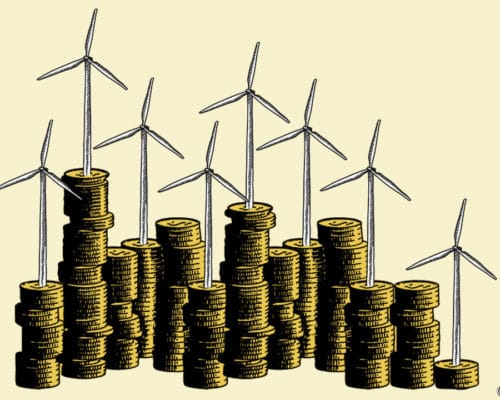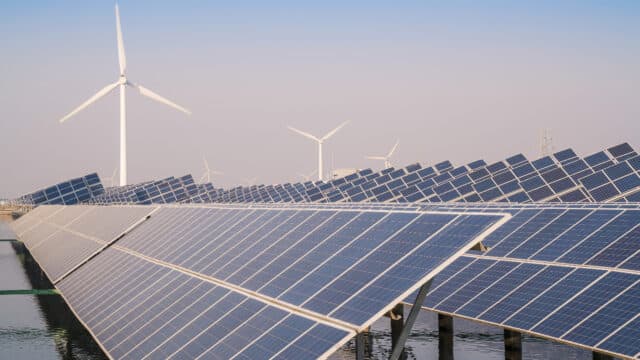Clean Energy Financing

The IMF’s Role: Economic Impacts of Climate Change on The Global Economy
Can the IMF create and implement economic policies to help countries through climate impacts?

Is “Greenflation” behind Higher Global Energy Prices?
Greenflation is a real risk on the mind of many renewable energy experts and rising commodity prices could increase the cost of the energy transition.
Energy Transition Fund – Capitalising on Renewable Energy
The global change to renewable energy has largely been financed by governments and public institutions but the energy transition cannot be fully funded by governments. There is significant room for the private sector to become more involved.
The Role of the Asian Development Bank in Southeast Asia’s Energy Transition
To ensure a seamless and successful energy transition, ASEAN countries should actively pursue public funding, regional cooperation and energy market redesign. How is the Asian Development Bank aiding the transition to clean energy?
Can Governments Implement Behavioural Change for Energy Transition?
While governments and big business are often held responsible for emissions, consumers also play a role. Behavioural change of consumers can influence change in both businesses and governments. These changes can drive impacts like subsidy swaps, fossil fuel funding restrictions, and global policies.
How Banks Are Making It Hard to Fight Climate Change
While banks are increasingly looking to diversify into climate-friendly portfolios, many institutions continue to back coal. Due to their increased responsibility and influential role in fighting climate change, banks should aim to end support for coal expansion and redirect financing towards renewable energy projects.
South Korean Green Taxonomy Declared ‘Gas is Green’
The government's decision to include gas in the Korean green taxonomy risks jeopardising the country's net-zero plans. Investors and environmental groups were quick to raise concerns, stating that, as a fossil fuel, gas carries high financial and climate risks. The question is will the Korean government listen?

How to Achieve UN Sustainable Development Goals and Targets [Part II]
The following years will have to make up for the lack of significant progress in the implementation of the SDG goals and targets since their introduction in 2015. The key to succeeding is in collaboration and striking a harmonious balance involving governments, companies, stakeholders and society.
Global Economic Recovery after COVID-19 Pandemic – What 2022 Holds for the Energy Market
We sit with experts and stakeholders from all parts of the energy market to discuss what 2021 taught us, how will the global economic recovery continue in 2022 and which will be the decisive factors for the energy market and climate finance in Asia going forward.
Stranded Fossil Fuel Assets: A Looming Burden
Stranded fossil fuel assets pose a significant risk for the world. They will affect governments, lenders, and private institutions. The only way to limit this risk is to shift investment away from new fossil fuel projects and develop policies to support the change.
The Spotlight on the Asia-Pacific’s Energy Transitioning to Net-Zero Emissions
Clean energy executive, analyst, and author Joseph Jacobelli argues that the Asia Pacific region has unique features when it comes to the electricity transition to Net Zero Emissions (NTZ). He thinks that the shift from polluting fossil fuels to green and sustainable energy sources will be the biggest in the world, that capital spending will eclipse all other regions, and that some power markets will lead while others will lag.
COP26: How Lack of Climate Finance Derails Coal Phase-out Agenda
The chaos around the last-minute change in the coal declaration by India, China and South Africa at COP26 has certainly made it harder to reach the 1.5-degree target. At the Glasgow UN climate summit, nations pledged to phase-out coal, reduce methane, end deforestation and support the energy transition, etc. With the USD 100 billion pledge of climate finance still not being fulfilled, small and developing countries called for climate justice. Many nations now plan to revisit their commitment by the end of 2022.
Countries Gearing Toward the Clean Energy Transition
Asia is the main engine behind the clean energy revolution. Developing and developed markets across the continent are now increasingly working towards a sustainable future. While challenges remain, the opportunities are huge. China, India, and the ASEAN countries' success stories are just a small example of what lies ahead.
Asia’s Pathway to a Sustainable Future
As the biggest energy consumer and leading CO2 emitter, Asia is the continent in the biggest need of tangible and collective action in the fight for a net-zero future. While the progress hasn't been on par with the EU and the US so far, experts are unequivocal - Asia is the continent that will experience the biggest renewable energy boom in the upcoming decades. For financiers, this means unrivalled opportunities.
Most Popular
Categories
-
10
-
34
-
126
-
4
-
17
-
46
-
52
-
11
-
10
-
15
-
24
-
6
-
1
-
5
-
6
-
283
-
200
-
17
-
24
-
1
-
1
-
23
-
41
-
44
-
88
-
18
-
86
-
41
-
17
-
11
-
43
-
54
-
86
-
299
-
22
-
44
-
36
-
11
-
42
-
36

